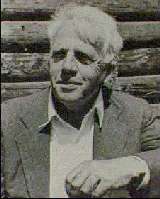
Born: March 26, 1874, in San Francisco, California, United States
Died: January 29, 1963, in Boston, Massachusetts, United States
Robert Frost was an American poet. Although he was rejected by publishers early in his career, he eventually established himself as a respected writer. Many of his works were dramatic monologues with themes of an individual's attempts to operate in his world. During his lifetime, he farmed, made shoes, taught school, and edited a country paper.
His father was William Prescott Frost Jr. Born in New England, his father worked in the schools as a teacher and headmaster. After his marriage, he moved to San Francisco and worked as a journalist. His mother was Isabella Moodie, a Scottish-born school teacher.
The family returned to New England when Frost was ten. His father had died of tuberculosis, and Isabella taught school to support Robert and his sister. Much of Frost's poetry describes the New England farms of his youth. Frost's mother, as the primary caretaker, encouraged Frost in his writing.
Frost was athletic, excelling in baseball and football. It was with the direction of his mother that he graduated from high school as co- valedictorian. The position was shared with his future wife, Elinor Miriam White.
After high school, Frost attended Dartmouth College as his grandfather wanted him to become a lawyer. However, Frost left school after one year and started working as a journalist and writer. His early poems were rejected by several publications. He married Elinor in 1895 and the couple ran a one room schoolhouse with Frost's mother.
The next decade was an unhappy one for Frost. He returned to school and attempted to become a farmer, but both ventures were unsuccessful. His son, daughter and mother passed away and he became very depressed, almost suicidal. During this time, however, he took many long walks and developed an interest in botany. During this time that he wrote some of his best poetry, but still, he was rejected by publishers.
In 1912, he moved his family to England where a publisher finally accepted his work: A Boy's Will in 1913, then North of Boston the following year. These volumes contain After Apple-Picking, and Mending Wall. In England, he associated with many of the Georgian poets and formed a close friendship with Edward Thomas.
With a secure reputation, he returned to the United States in 1915 and settled on a farm in New Hampshire. For the next ten years, he supplemented his writing by teaching and holding positions of poet-in-residence at Amherst College and the University of Michigan. Publications included Mountain Interval in 1916, which included Birches and The Road Not Taken.
Frost received much recognition from this point forward, and received four Pulitzer Prizes between 1928 and 1942. His wife died in 1939. He was a prolific writer, producing works through to 1962, when In the Clearing was published. During his lifetime, he was put in the category of Wordsworth and Emerson. Today, he is still one of the most popular contemporary poets.